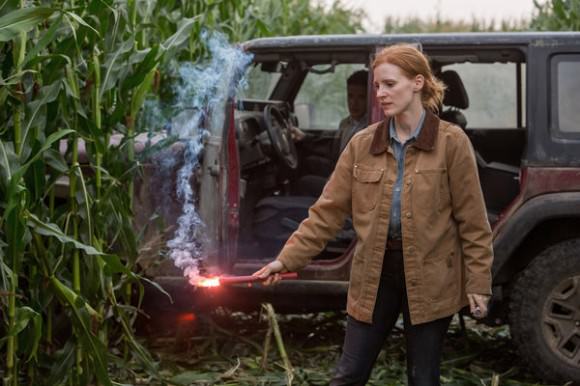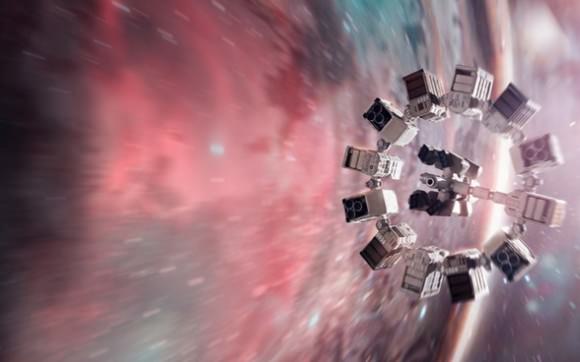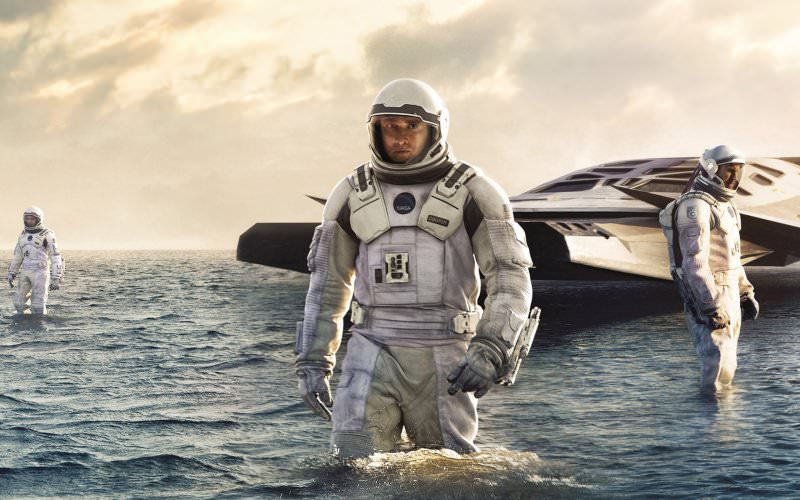Science fiction aficionados, take heed. The highly-anticipated movie Interstellar is sharp and gripping. Nolan and cast show in the end that they have the right stuff. Nearly a three hour saga, it holds your attention and keeps you guessing. Only a couple of scenes seemed to drift and lose focus. Interstellar borrows style and substance from some of the finest in the genre and also adds new twists while paying attention to real science. If a science-fiction movie shies away from imagining the unknown, taking its best shot of what we do not know, then it fails a key aspect of making sci-fi. Interstellar delivers in this respect very well.

The movie begins quite unassuming in an oddly green but dusty farmland. It does not rely on showing off futuristic views of Earth and humanity to dazzle us. However, when you see a farming family with a dinner table full of nothing but variations of their cash crop which is known mostly as feedstock for swine and cattle, you know humanity is in some hard times. McConaughey! Save us now! I do not want to live in such a future!
One is left wondering about what got us to the conditions facing humanity from the onset of the movie. One can easily imagine a couple of hot topic issues that splits the American public in two. But Nolan doesn’t try to add a political or religious bent to Interstellar. NASA is in the movie but apparently after decades of further neglect, it is literally a shadow of even its present self.
Somehow, recent science fiction movies — Gravity being one exception — would make us believe that the majority of American astronauts are from the Midwest. Driving a John Deere when you are 12, being raised under big sky or in proximity to the home of the Wright Brothers would make you hell-bent to get out of Dodge and not just see the world but leave the planet. Matthew McConaughey adds to that persona.

We are seemingly in the golden age of astronomy. At present, a science fiction movie with special effects can hardly match the imagery that European and American astronomy is delivering day after day. There is one of our planets that gets a very modest delivery in Interstellar. An undergraduate graphic artist could take hold of NASA imagery and outshine those scenes quite easily. However, it appears that Nolan did not see it necessary to out-do every scene of past sci-fi or every astronomy picture of the day (APOD) to make a great movie.
Nolan drew upon American astro-physicist Dr. Kip Thorne, an expert on Einstein’s General Relativity, to deliver a world-class presentation of possibly the most extraordinary objects in our Universe – black holes. It is fair to place Thorne alongside the likes of Sagan, Feynman, Clarke and Bradbury to advise and deliver wonders of the cosmos in compelling cinematic form. In Instellar, using a black hole in place of a star to hold a planetary system is fascinating and also a bit unbelievable. Whether life could persist in such a system is a open question. There is one scene that will distress most everyone in and around NASA that involves the Apollo Moon landings and one has to wonder if Thorne was pulling a good one on old NASA friends.
Great science fiction combines a vision of the future with a human story. McConaughey and family are pretty unassuming. John Lithgow, who plays grandpa, the retired farmer, doesn’t add much and some craggy old character actor would have been just fine. Michael Cane as the lead professor works well and Cane’s mastery is used to thicken and twist the plot. His role is not unlike the one in Children of Men. He creates bends in the plot that the rest of the cast must conform to.
There was one piece of advice I read in previews of Interstellar. See it in Imax format. So I ventured over to the Imax screening at the Technology Museum in Silicon Valley. I think this advice was half correct. The Earthly scenes gained little or nothing from Imax but once they were in outer space, Imax was the right stuff. Portraying a black hole and other celestial wonders is not easy for anyone including the greatest physicists of our era and Thorne and Nolan were right to use Imax format.
According to industry insiders, Nolan is one of a small group of directors with the clout to demand film recording rather than digital. Director Nolan used film and effects to give Interstellar a very earthy organic feel. That worked and scenes transitioned pretty well to the sublime of outer space. Interstellar now shares the theaters with another interesting movie with science fiction leanings. The Stephen Hawking biography, “The Theory of Everything” is getting very good reviews. They hold different ties to science and I suspect sci-fi lovers will be attracted to seeing both. With Interstellar, out just one full day and I ran into moviegoers that had already seen it more than once.
Where does Interstellar stand compared to Stanley Kubricks works? It doesn’t make that grade of science fiction that stands up as a century-class movie. However, Thorne’s and Nolan’s accounting of black holes and worm holes and the use of gravity is excellent. Instellar makes a 21st Century use of gravity in contrast to Gravity that was stuck in the 20th Century warning us to be careful where you park your space vehicle. In the end, Matthew McConaughey serves humanity well. Anne Hathaway plays a role not unlike Jody Foster in Contact – an intellectual but sympathetic female scientist.
Jessica Chastain playing the grown up daughter of McConaughey brings real angst and an edge to the movie; even Mackenzie Foy playing her part as a child. Call it the view ports for each character – they are short and narrow and Chastain uses hers very well. Matt Damon shows up in a modest but key role and does not disappoint. Nolan’s directing and filmography is impressive, not splashy but one is gripped by scenes. Filming in the small confines of spaceships and spacesuits is challenging and Nolan pulls it off very well. Don’t miss Interstellar in the theaters. It matches and exceeds the quality of several recent science fiction movies. Stepping back onto the street after the movie, the world seemed surprisingly comforting and I was glad to be back from the uncertain future Nolan created.


I’ve seen the movie, and as with any SF, don’t punch to hard on the S part.
The concepts used in the film do access your fantasy about space topics in a way you do not see everyday.
I thought it well done. (!)
Maybe an idea to give Nolan the book from David Brin & Gregory Benford: Heart of the comet.
Although, maybe together with Willy Pfister as director…
Zoutsteen. Thanks for your comments. Yes, what kept Interstellar a very good sci-fi but not great was the script. Just a good script and great director does not make great or “one of the best.” I’ll consider reading “Heart of the Comet.”
“Mission to Mars”, one of the worst sci-fi movies I’ve wished I hadn’t seen was directed by Brian DePalma. He could not save it.
“2001” had it all. It did not have big stars. The story from Clark and direction by Kubrick made up for that and then some. Because human spaceflight has lagged and has been stuck in low-Earth orbit for 40 years, “2001” is not yet a period piece. How and once we discover life beyond Earth, travel beyond LEO and computers that are self-aware, then that film will become classic rather than an instruction manual.
I would give it a B- and that is more charitable than my wife.
The music in the ‘exciting’ parts was much too loud.
Murph cracks the code then we jump to “100 years later” – how did they get there? Speaking of which, if they cracked gravity why not artificial gravity. (Or did they – I couldn’t read his message to his daughter, so I really don’t know what it said.) The spinners could almost be done now.
We wanted to see what came after Murph threw the papers around.
Medical technology didn’t seem to change much. It has changed a bunch in the last 60 years that I know about so I would assume that it will continue on the same rate of increase.
Speaking of increase, I did like the robots. Glad they didn’t waste money on humaniform robots.
We’ll need some more grading to get some stats working but the box office will tell.That makes 2 theaters with “too loud” comments. In the moment, there was one scene that I thought too loud. But a gentleman I spoke to was more adamant. I agree- the robots were cool maybe easy on the budget, too.
I agree. The tech level didn’t all jive but I think he deliberately chose not to do a full Monty on future tech. There might have been budget limits too. Using film then the man/fem hours and super computer hours– expensive. Leaving the story cryptic allows us to imagine. Are people seeing it twice or more getting more out of it?
“The music in the ‘exciting’ parts was much too loud.”
Saw it tonight. Amen to that.
Walter, the movie implies items, that are not explained.
Example: Lifestock?? (No hotdogs at baseball game, only popcorn)
Example: A perfectly spherical world with a toplayer of water, because ….
But details sparkling thoughts on the S part in SF also have a side effect of seeing details that do not work out at all. But that is the F in SF.
A second viewing would be okay, although I myself will wait a year.
I really like the imagery of McConaughey and them wading into a shallow sea on another planet. Wow, very cool. We always imagine landing on terra firma of other planets, not water (well “…the Apes” kind of did).
I went and saw Interstellar last night. The last two movies I went to the theater for were 300, and Little Fockers back in 2010. I don’t usually enjoy a movie theater in comparison to the comfort of my own house, but Interstellar got my attention and made me crave the large screen and loud noises that accompany going to a movie theater. Yup, some loud noises were a bit too much and drowned out some of the dialogue, which had me reaching for my remote out of habit to turn it down.
I really enjoyed this move. I’m big into astronomy, and currently working on a degree in college. Yes some science was “bad” but we have to remember, it is science FICTION. I have never put on a science fiction movie in hopes that they get all the science right. I go to a science fiction movie because they entertain me the most and get my attention all the way through. This movie had my attention from the very beginning to the very end. Of course there was a bit of dialogue here and there that was a bit corny, but again, that’s science fiction for you. There was science that was a bit off, such as the planet near the black hole (I’ll leave the science bashing to Phil Plait), but none of this made me dislike the movie. I thought the story was pretty good, and it has left me still thinking about it today.
All in all I would make a horrible movie critic, and with that said, I really like this movie and highly recommend it to any fans of sci-fi. I won’t talk directors, because that doesn’t mean much to me from my movie going experience, I won’t talk actors, because I’m horrible with names, and sometimes I like an actor, and sometimes I don’t. If you’re a bit iffy on the movie then wait until it comes out. If you want to be entertained, and think a bit about a movie and you got 3 hours and some money to spare, then go to the theater, the experience (for me anyway) was well worth it.
On your recommendation, I’ll buy stock in Paramount! 🙂 Thanks for the honest john comment.
I think the problem with the science side of things is that they made a big deal about science in the film, and tried to show that the main characters had a real passion and respect for science. That made you expect the science portrayed to be accurate, but it wasn’t.
The result was that both sides of the audience were let down. Those without a passion or knowledge for science were possibly bored or confused, and would have preferred a big dumb blockbuster. While those who do enjoy and understand the science were annoyed because so much of it was wrong.
I got the feeling throughout that the ambition was to make a 2001 for this generation, and they had the fantastic director in Nolan, but forgot that half of 2001’s success came from the writing by Arthur C Clarke.
And yeah, it was way too loud.